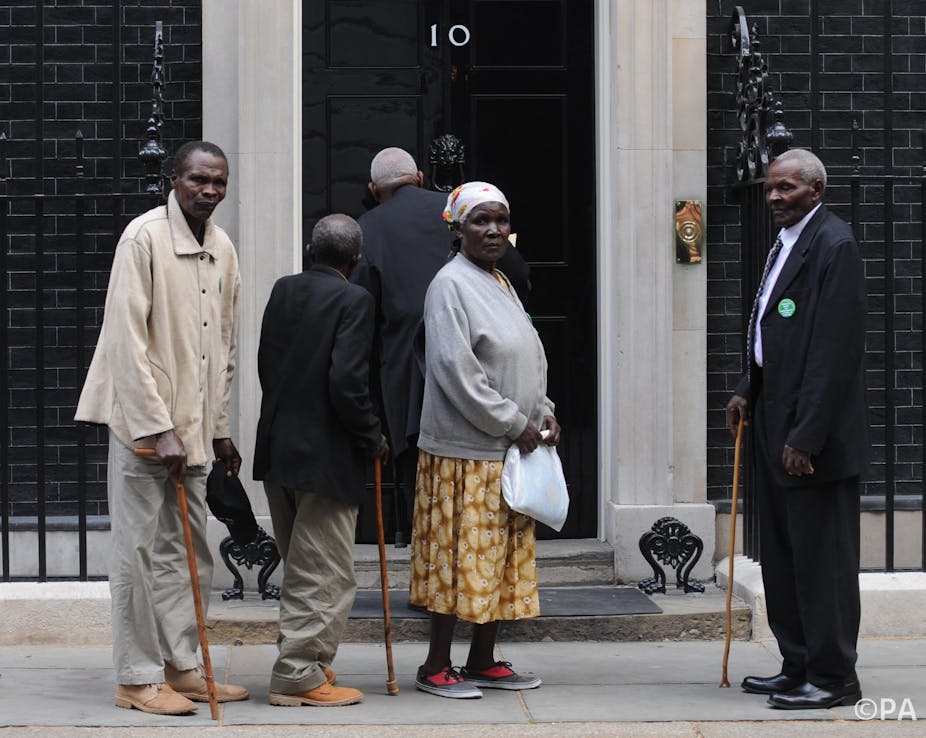Today is a good day for Paulo Muoka Nzili, Wambuga wa Nyingi and Jane Muthoni Mara. After their decade-long struggle for justice, and 50 years after Kenyan independence, Britain’s foreign secretary, William Hague, will give them what they wanted – an apology and admission of guilt for Britain’s brutal suppression of the Mau Mau insurgency in colonial Kenya.
The British government will also fund the construction of a new monument to the Mau Mau fighters and pay out around £14 million in compensation to 5,000 elderly Kenyans who have been able to prove that they too were tortured by the British security forces.
The surviving 5,000 victims are only a fraction of those who suffered at the hands of British forces and their Kenyan allies between 1952 and 1960. At least 25,000 Kenyans, and some argue many more, lost their lives during the counterinsurgency campaign.
The colonial state deliberately trampled over the human rights of British subjects in the forests of central Kenya, in British detention camps, prisons, specially constructed villages to which tens of thousands of Kenyans were forcibly relocated, and on the gallows. It was an effort that involved the use of the civil service and the courts as well as the police and army.
Systematic torture by the British forces was hidden behind a veil of rhetoric arguing that that they were fighting to protect law and order against a criminal insurgency.
Courageous fight for the truth
The three elderly and frail claimants have demonstrated considerable resilience and courage to reach this point, served ably by a fine legal team. The case has also been given inestimable assistance by a small group of committed, skilled historians. Caroline Elkins, Huw Bennett and David Anderson provided vital context, informed analysis and, most importantly, brought to light crucial evidence previously withheld from the public domain by the Foreign and Commonwealth Office.

No doubt there will still be some who argue that the colonial regime’s violence in Kenya was the work of a few “bad apples” or that Mau Mau’s own violence justified the extreme British response. But such individuals have long been fighting against the enormous weight of historical evidence to the contrary. What is remarkable about the voluminous material disclosed as a result of this case is that it has merely confirmed what the likes of Anderson and Elkins had already argued - and what Kenyans had known since the 1950s.
Given the relatively small sums involved, one cannot help but wonder why it has taken so long for the British to agree an out-of-court settlement, particularly once the government accepted the veracity of the claimants’ testimony. The only sensible answer to this question seems concern about precedents being set for other former colonies.
Could this have happened elsewhere?
The Kenyan case has been followed closely by human rights groups in Malaysia and Cyprus. Counterinsurgencies were fought in both under similar conditions and, often, by the same individuals as those sent to Kenya to suppress Mau Mau. Other similar campaigns were mounted in Palestine and Aden.
But it may be difficult for those from such places to bring cases against the British government similar to that won by the Kenyans. The combination of expertise advising the case and the weight of documentary evidence may be difficult to replicate. It may also be the case that Kenya’s white settler population may have given a particularly vicious edge to the counterinsurgency there that was not replicated elsewhere.

Whether or not successful claims are now made from other former colonies, the Kenyan case should force a reconsideration of recent British military history. The counterinsurgency campaigns mounted in the imperial twilight were a source of great pride in military and political circles. Looking to Vietnam and Algeria, the British public were frequently reassured that their small wars were less bloody and more justifiable than those mounted by the Americans and French.
Moreover, this version of these late colonial wars was embedded in the education given to officers in the British armed forces, informing actions in Ulster, southern Iraq and Afghanistan. Should we not now ask whether or not a line can be drawn connecting events in Kenya to more recent controversies, such as the death of Baha Mousa?
The case and the testimony of the 5,000 victims now to be compensated will pose awkward questions for Kenyans too. The role of Kenyan supporters of the British counterinsurgency campaign, particularly in the 25,000-strong Home Guard, may well come under greater scrutiny now. But perhaps the greatest effect of this case may be to draw something of a line under Mau Mau.
The post-colonial state was constructed from the ruins of a society devastated by the violence of the 1950s. In this year, the 50th since independence, Hague’s announcement provides a coda, albeit an imperfect and belated one, to efforts by Mau Mau veterans to seek justice and recognition that date back to the colonial era. That in turn may allow for a more sustained, forensic examination of the crimes of the post-colonial era.
Whatever the future holds, today is a day on which Kenyans should be proud of three of their most distinguished compatriots. More than 50 years after the defeat of their stand against British colonialism, Nzili, Nyingi and Mara have used the same institutions and language of law and order that were used to demonise their brothers and sisters in Mau Mau to devastating effect. Victory is, at last, theirs.

